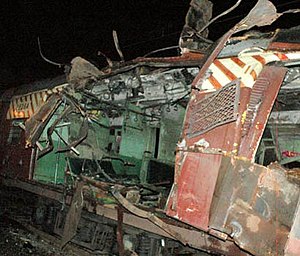2006 Mumbai train bombings
| 11 July 2006 Mumbai train bombings | |
|---|---|

One of the bomb-damaged coaches at the Mahim station
|
|
| Location | Mumbai, Maharashtra, India |
| Date | 11 July 2006 18:24 – 18:35 (UTC+05:30) |
| Target | Mumbai Western Line |
|
Attack type
|
Train Bombings |
| Weapons | Pressure cooker bombs |
| Deaths | 209 |
|
Non-fatal injuries
|
Approximately 714 |
| 11 July 2006 Mumbai Train Bombings |
|---|
| Articles |
| Reactions |
| Investigations |
| See also |
| Mumbai Suburban Railway |
The 11 July 2006 Mumbai train bombings were a series of seven bomb blasts that took place over a period of 11 minutes on the Suburban Railway in Mumbai, the capital of the Indian state of Maharashtra and the nation's financial capital. The bombs were set off in pressure cookers on trains plying the Western line of the Suburban Railway network. 209 people were killed and over 700 were injured.
Pressure cooker bombs were placed on trains on the western line of the suburban ("local") train network, which forms the backbone of the city's transport network. Pressure cookers were used in this bombing and other recent explosions to increase the afterburn in a thermobaric reaction, more powerful than conventional high explosives. The first blast reportedly took place at 18:24 IST (12:54 UTC), and the explosions continued for approximately eleven minutes, until 18:35, during the after-work rush hour. All the bombs had been placed in the first-class "general" compartments (some compartments are reserved for women, called "ladies" compartments) of several trains running from Churchgate, the city-centre end of the western railway line, to the western suburbs of the city. They exploded at or in the near vicinity of the suburban railway stations of Matunga Road, Mahim, Bandra, Khar Road, Jogeshwari, Bhayandar and Borivali.Home Minister Shivraj Patil told reporters that authorities had "some" information an attack was coming, "but place and time was not known".
...
Wikipedia
